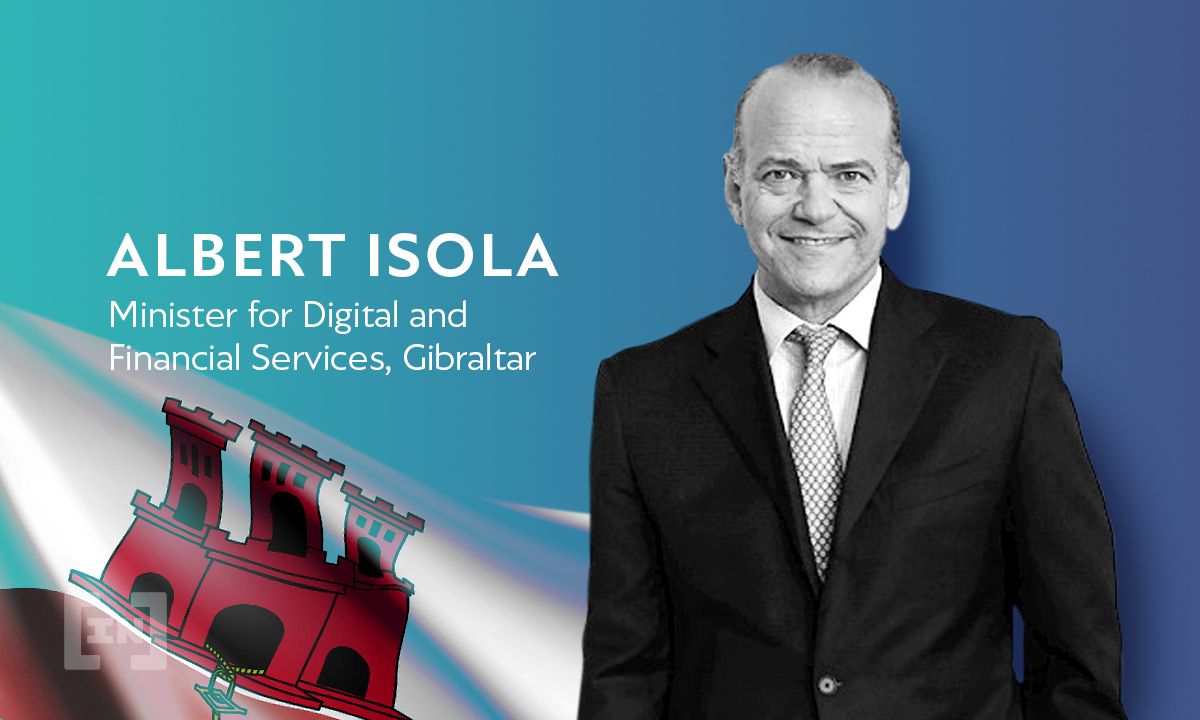BeinCrypto spoke to Minister for Digital and Financial Services in Gibraltar, Albert Isola, about the British Overseas Territory’s work in building a regulatory framework for distributed ledger technology.
Blockchain and cryptocurrency regulation is no easy task. Governments worldwide are battling to figure out how they should respond to the surge in this novel area of both finance and technology. The response globally is varied from the SEC in the United States chasing up crypto firms to the other countries’ outright ban of cryptocurrencies.
One territory that has been on top of its game when it comes to regulations is Gibraltar. Despite its small size, Gibraltar has been among the earliest and more forward-thinking governments globally when it comes to cryptocurrency and blockchain technology.
In 2014, a private sector Cryptocurrency Working Group was established to look into cryptocurrencies. This came right after bitcoin’s first bull run and the first peak in interest in crypto globally.
This private working group then joined the government of Gibraltar in accessing whether cryptocurrencies and their underlying technology matched the risk profile of the jurisdiction, whether it was safe and whether there was a benefit in becoming involved with it.
“All of these things were put into a melting pot, and that led to a series of consultation papers that were issued. The interesting thing was we issued three different consultation papers over a couple of years. Every one that we issued we got more and more response and interest, internationally, which for us was interesting,” explains Isola.
“We took the view also that by bringing in pragmatic and proportionate regulation, we will also be keeping out stuff from the jurisdiction that we didn’t want to happen here. Which is also a risk because if you don’t regulate it, it can happen if you don’t license it, they can come and do it in your jurisdiction. So we dealt with both things at the same time, in what we call the DLT legal framework, which we published in October of 2017.”
The law came into effect in January 2018. This was quickly followed by a positive response from DLT blockchain firms, applying for licences.
“Now we’ve got around 15 that are fully licensed and regulated. We’ve also got some more in the pipeline coming through,” says Isola.
“What they need most from the regulator is interaction”
Isola credits Gibraltar’s proactive approach to this emerging sector and professionalism by the regulator for the its success.
He explains that the firms are able to speak to the regulator about any issues and understand what is expected of them.
“What we want here is that if any firm has got a problem, the first place they call is the regulator. Last thing we want them to do is to hide it, try and fix it themselves without telling anyone. Those have got disaster written all over them. So, what we do in providing proportional regulation is have a regulator that you can pick up the phone and talk to and talk through opportunities and challenges.”
He explains that this relationship has to be built on a professional understanding, rather than a patronizing, antagonistic stance.
“Our regulators are not like many regulators around the world who treat firms like schoolchildren. For our regulator, the firms are their clients, and I expect them to give their clients a good level of service where they answer phone calls, return emails.”
A collaborative approach from the start
Isola stresses that the role of the regulator is not to force firms to submit to the legislation but rather ensure they are willing participants in the process.
“We have what we call a pre-application stage. The reason for that is that we want to speak to these firms before they make an application so that they can understand what we require of them, and we can understand what they want to do here,” he explains.
This has a knock-on effect, where firms that don’t meet the necessary standards can identify where they are lacking and improve.
“So the process of licensing has led to them meeting the standards over a period of time in the application process which takes up to a year. To get their corporate governance in order, to get their AML process in order, because they’re very good at tech, but not too good of corporate governance. there are others who are very good at corporate governance and also good on tech. So through the whole process has handheld these guys through, coming out in a much better place than they started,” he says.
“So the licensing process is not a question of forcing people through the head of a needle, it’s about getting to the same place that we want to be together, in the shape that we need them to be in order to meet the standards that we set.”
“You’ve got to know what you want to get to before you can start”
Isola recommends those wanting to create policies around blockchain and crypto work with experts in their jurisdictions to ensure they understand the space.
“I think the more that countries interact with the experts in that jurisdiction, the better because governments don’t understand this business, but they do. So it’s a question of balancing out a process and a structure that is good for business with the protection of jurisdiction, its consumers, and its reputation from the risk that these things have, and mitigating risk is a part of what we do. So, without engaging with the experts in each of the jurisdictions then you’re going to have a problem.”
Keeping up with the times
Another lesson for regulators from Gibraltar is the nature of their legislation. Much like the crypto and blockchain space, the DLT legal framework is somewhat dynamic. Recently, updates were initiated to reflect the current state of the blockchain industry and its technology.
Isola points out that this was inherent in the original design of the legislation. “We created what we call the main core principles because we appreciate that you couldn’t box this up in legislation like you can do in insurance or in funds or wealth management or in banking.”
“So we did this on principles which are quite wide. And so, to assist those principles, we issued comprehensive guidance notes. What’s happened between that and today is that the core principles are still relevant, but the guidance notes needed some refreshing and updating because things have moved on.”
“The better the guidance notes, the better people understand what the regulator is seeking and obviously the better the result in terms of the regulation, the more effective,” he says.
An international standard on the horizon
Isola believes that regulatory standards are progressing across different countries. He points to the current movements across the world as governments slowly push past roadblocks and issues. “These things need to develop, and I’m sure they will,’ he says. “So I think the sooner we get there, the better.”
‘I think we’ll we’ll get to the stage where there will be developing international standards like there are in other areas of traditional financial services, and that will benefit the sector enormously.”
Disclaimer
In compliance with the Trust Project guidelines, this opinion article presents the author’s perspective and may not necessarily reflect the views of BeInCrypto. BeInCrypto remains committed to transparent reporting and upholding the highest standards of journalism. Readers are advised to verify information independently and consult with a professional before making decisions based on this content. Please note that our Terms and Conditions, Privacy Policy, and Disclaimers have been updated.

